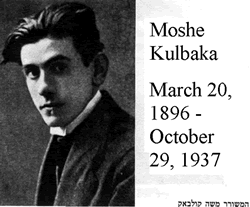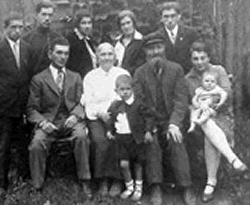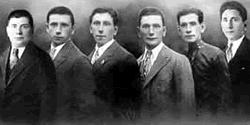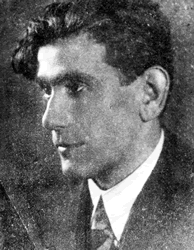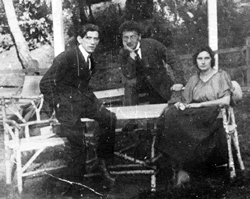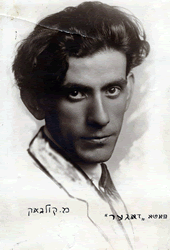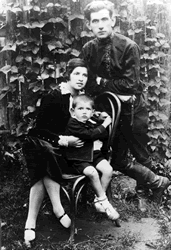Recollections
by Raya Kulbak
(Edited by Eilat Levitan and Kevin Lo)
(An online translator was used on the original Russian document)
I would like to thank Leon for writing to me about the page in Russian:
"Date of Moishe's death is 29.10.1937. Here is a page with
a lot of information about him:
http://www.ibiblio.org/yiddish/EK/ek971205-1.html
Best regards,
-- Leon Koll
Yehud, Israel"
To start, two dates. The first, March 20, 1896: A hundred years since the birth of the Jewish poet, writer, and playwright Moshe (Moiseju) Kulbak. The second date, October 29, 1937: sixty years ago since Moshe was executed, shot, died. With life under a totalitarian regime being all that it is, the life of Kulbak lasted only forty-one years. The boy who would later die by execution began his studies in Volozhin Yeshive, learning of the Jewish olden times, of the wisdom of the Torah, and of other sacred studies. During the senior classes of the Yeshiva, he studied Russian and read works of Russian and Jewish literature. In 1914 he moved to Minsk, and his first poem "Shterndl" (Asterisk) subsequently become a national song. By the time he moved to Vilnius, the poem had been published in 1916 in "Literarishe peftn" (Literary writing-books). One of his best books was the collection “Shirim,” published by the Jewish writers union and the journalists in Vilnius in 1920 in a printing house of the brothers Rosenta. (A duplicate edition of this book was distributed by Fund Sarry and Manfred Frenkel in Antwerp in 1991). In his mid-twenties, Kulbak started writing prose, novels like Mashiah ben-yoaei (Monday), and drama plays like Jaakov Franc. In his thirties, having returned to Minsk, he published the well-known story "Zelmenjane,” a satirical poem called "Chajld Harold from Diena,” and the three-act drama poem "Robber Bojtre" (1936) which was recently performed under the direction ofS.Mihoelsom (the role of Bojtre was superbly executed by V. Zuskin). “Bojtre” was performed in Israel, on a stage at the Chamber Theatre.During M. Kulbak's Minsk period he contributed to the magazine "Der shtern,” worked at the Academy of Sciences BSSR, translated on Yiddish verses of Belarus poets Janki Kupaly and Jakuba Kolasa "Auditor" Gogol. Beyond his work at the Academy of Sciences, he also engaged in literary activity. He had been ready to do much more, but with the year 1937 came tragedy.
According to documents on Moshe Kulbaka at the People's Commissariat of Internal Affairs, he had two children (whose names do not appear in business materials; Kulbak probably decided to not refer to them by name in order to keep them safe). "For my brother and I,” the daughter of the poet recollects, “this saved our lives since children of persecuted parents suffered greatly.” As for the children of Moshe Kulbaka, his son Ilya Kulbak was killed by German fascists in 1942 in Lapichi of the Mogilyov area BSSR. It is possible to learn about the last months of his life and the death of the parents of M. Kulbaka through Inna Vojnovoj's memoirs (They had earlier been published in translation into Yiddish in a magazine called “Sovetish Gejmland,” N 8, 1990). His daughter Raya Kulbak has lived in Tel Aviv since 1990. The daughter of the poet found out about Moshe (Moiseja) Kulbaka from the answer of KGB BSSR to an inquiry of the Academy of Sciences. (The actual transcript is stored in the archives of the Academy.) According to this information, Moshe Kulbak was arrested on September 11, 1937. More than twenty people were also arrested – all representatives of the Jewish creative intelligencia. Among the arrested people were the poet Izi Harik, literary critic Jacob Bronstein and others. All of them were accused of actions directed against the Soviet authorities. The courts gave them all guilty verdicts and with rare exception, gave all of them identical sentences: death. Reconsideration of the conviction and execution of Moshe Kulbak was initiated by his wife Zeldy Kulbak.Moshe Kulbak had been exonerated, but the date of his death was never specified. Raya Kulbak says, “My mother Kulbak Zelda (Evgenie) was also arrested and sentenced to ten years solely for being his wife.” For a year she was left there. After her imprisonment, she had been forbidden from living in large cities.Mother had been released in 1956. Her attempt in 1957 to establish the date of death of my father and his place of burial has revealed no results.On this question, the military board of the Supreme Court of USSR said that the exact dates of the death so unreasonably condemned were not available. She asked whether the date of death of her husband - on July, 17th, 1940 had been arranged and she was given some information on the death.Mum handed over this information to the Registry Office in Minsk and on this basis, she received a death certificate of Moshe Kulbaka in which the dates of birth and death were wrong. (His true date of birth was March 20, 1896 and his date of death was October 29, 1937.) Mum died on October 20, 1973.When at last during reorganization I was allowed to correct the date of death, I addressed the military board of the Supreme Court of USSR with a request to amend the circumstances, date and place of a burial of my father. Specifically, I noted that the wrong date of a birth appeared on Moshe Kulbaka’s documents and that his place of burial was not specified.
In the village of Kuropaty, which is now the suburb of Minsk, archeologists unearthed the mass graves of executed prisoners from the Stalin period. Before my departure to Israel, I visited them. I felt that the last minutes of my father’s life were spent here, in Kuropatah. I have seen that same sky that my father saw during his last moments.
About the destruction of the relatives of M. Kulbaka
(From Inna Vojnovoj's memoirs, born in 1931, the senior scientific employee of the Scientific Research Institute, now a pensioner)
I, Voinova Inna Viktorovna, was born in 1931 in Minsk. My father and mother were subjected to persecution; my father in December of 1936 and my Mum in November of 1937. My father last worked as the editor of the Republican bulletin BelTA (the Belarus branch of TASS), and my mum worked at Belgos Universitete (a senior lecturer and the secretary of a Communist Party organization at the university). Tonja, the sister of the poet Moiseja from Toni Kulbak's family, was a close girlfriend of my mum. In December 1936, they arrested my father and then Mum was sent to prison in November 1937. They wanted to send me to the children's home, but I started to cry since I had been afraid to go there. Mum called Tone Kulbak, and she took me to her house, where I lived for a while with Aunt Toni. She had a daughter named Matusja (Matilda), who was a year older then I. The brother of Aunt Toni, poet Moisej Kulbak, and his wife had been arrested at the same time. Their children, Raya and Ilya, had been taken away and sent to different children's homes. Tonja worked hard to look for them and found her nephews in Ukraine. Both were rescued from children's homes and thus, the family was once again numerous with her husband, four children and their servant Katya who traveled with them from the Far East. Tonja was a person with a big heart. She and her husband were equally concerned with all the children and nobody got any less love. As I now realize, they had little to call their own, but they gave all that they had to the four children. It was necessary to dress and feed them all, but Tonja never complained of difficulties. She and her family lived in two rooms of the general apartment, and in the third lived their neighbor Gita Galper. Her husband too has been arrested. Up to the beginning of the war (June 1941), Matusja, Ale, and I went to school and Raya went to a kindergarten. In the summer of 1941 the kindergarten that Raya attended had taken the kids to a summer camp in Ratomku, while Matusja and I were to go in July to pioneer camp in Talc. When the war began, Minsk was bombed first and all the land around us burned. It was necessary to leave the city. Tonja raced to Ratomku to take Raya from the summer camp, but the kindergarten had already evacuated. So we left Minsk on June 26 of 1941. Tonja took with us her old parents who also lived in Minsk on Starovilenskoj Street and also two young brothers of Aunt Marry (wives of M. Kulbaka). We left the city on foot on the highway Mogilevskrmu, which went through the settlements of Smilovichi, CHerven, etc. We usually traveled twenty to twenty-five kilometers per day. We could not go more quickly, since the parents of Toni were very old. Here and there it was possible to seat them on a supply truck, but basically they went on foot like the rest of us. Therefore we were not on time for any of the evacuation trains that left for the east. Each time we reached any railway station, we were told that the last train for refugees had left yesterday. By the time we got to Klicheva, we learned by radio that the Germans had already overtaken us. They were already beyond Dnepr though we did not yet see them since Klichev was distant from the basic roads that the Germans traveled upon. Here in Klicheve, in an unfinished house, we lived for ten to twelve days. To go forward would make no sense, so we decided to return to Minsk. In a few days, we arrived at Lapichi of the Osipovichskogo area. Here, we heard rumors that Germans had organized a ghetto in Minsk where they forced in all the Jews.
We stayed in Lapichah. It was not a big place, but there were many Jewish families. Along with many other people who had not fled in time, we stayed with these families. I have only sad memories for August 18, 1941. Before the war, this day had marked Aviation Day. Rumors had been passed around that said that by Aviation Day, our armies would come to save us. Ironically, the opposite happened: on August 18, 1941, the place was surrounded with Germans and politsai who herded all the Jewish men to the nearby woods to have them shot. On this day the husband of Aunt Toni, Joseph Meerovich Krol, and both the brothers of Aunt Marry were lost. There remained only women, children and old men. We lived, certainly, in constant fear; every day we awoke to news that that more people had been executed, even women and children. In January of 1942, the politsai and Germans surrounded a part of the town and drove out the Jewish population in three houses. Everyone was sure that it is their end, but after two or three hours, the Germans suddenly declared that all of them could go home and that they were to pack warm winter garments. However, they left behind some old men and several teenagers. They then picked a place next to the village fence and shot these ten to twelve people. That day, the father of Aunt Toni and Ale (Ilya) Kulbak (son Moiseja Kulbaka) lost their lives. The women and children were still alive until April, 1942. In April (the exact date I do not remember), retaliatory groups from Osipovichej, politsai and Germans surrounded the village, collected all of the women, children, old men, and shot them all. I am only alive due to my lucky fate. When the Germans came to take everyone away, my Aunt Tonja told the German that there was a Russian girl whose parents had been arrested and that she lived in the house. The German ordered me to go to the other half of house, where a Russian family lived. And so I continued to live. The Germans had not allowed Jews and Russians to live together. It is obvious that destiny meant for things to happen this way so that I could live, for if in January the retaliatory group had arrived, I would have been lost with the rest. So Toni Kulbak's family was not lost in one day. Her husband Joseph Meerovich was lost in August 1941, while her father and Ale died in January 1942 and Toni's mum and her daughter Matusja in April 1942. Also all of them are buried in different tombs. Before the war ended, Ale Kulbak took a great interest in a photo. I do not remember much, save that it contained written verses.
Before the war ended, I lived in another village. When Belarus was liberated from Germans, I found Mother, through my relatives in Moscow. At that time, she had been in a camp in the Karaganda area. In 1946, I returned to Minsk, where I studied at an evening school and worked at a radio factory. Mum returned after the autumn of 1946 and found work in Borisov since it was not authorized to work in the capital. By 1947, I arrived in Boriss, where I continued to study at an evening school and worked at a piano factory. I left school in 1951 and acted in Belarus until 1956. In 1956, I worked in a scientific research institute (lab assistant and then as the senior scientist). In 1988, I retired. I married in 1956 and I had two sons with my husband, who is a doctor. My sons are already adults; the older, Victor, is a mathematician and programmer while younger, Leonid, is an engineer and electronician.
Inna Viktorovna VOJNOVA,
Minsk,
On January 19, 1990
From the papers of M.Kulbaka
(Records were made by Minsk journalist Andrukovich Maria Konstantinovnoj in the KGB archive under the sanction of the curator.)
The warrant on M.Kulbaka's arrest was given out on September 11th. This very day M. Kulbak was arrested. The ruling was issued on September 5, 1937, with the signature of the assistant operupolnomochennogo, an investigatory department of the Management of State Security Farbera. In a corner is an inscription: "I agree. The chief of the department. Furthermore, I approve.” Also present was the signature of national commissioner Tsanavy (all signatures were wide and in color pens).
The choice of preventive sentence and the presentation of charges
On September 15, 1937, Kulbaka Moiseja Solomonovicha was arrested as an active participant in the counterrevolutionary Trotskistskoj, the terrorist organization and as a Polish agent. No.72, 76, 68, 79, 69 (68th - espionage, 72nd, 76th - Trotskistskaja activity, 69th - rendering assistance to enemies - the curator). The prison sentence would be carried out at the Minsk prison of the People's Commissariat of Internal Affairs. (The curator told me that there this prison was on a square of Freedom where the regional GAI was later located).
Below - the signature accused: Kulbak (ink).
On September 11, a search was conducted. At this search, Minkin Maria Vulfovna was present. M.Kulbak agreed with these stipulated detention facts. The following items were confiscated: a passport addressed to Kupbaka, a trade-union card, a ticket of the joint venture of USSR N 1552, a personal military book, 3 letters addressed to Kulbaka Moiseja, Kulbak Zeldy Borisovny, Morozovoj F.D., six railroad tickets, twelve photographs, 154 pages of working correspondence, a notebook (on the underside of this form is written "Attention: Books and letters. 29.09.37. Documents in the report of the search were taken away - A.M.K.) A complaint of the search was not declared. Two rooms were sealed up for a search.
THE REPORT OF THE PERSONAL SEARCH
Nothing was found.
The signature (Kulbak) A.M.K.: - the same handwriting.
The curator: While the inspector conducted the search, someone else took notes while two or three others sat around.. There were always two or three people. Here is the questionnaire of the arrested person.
THE QUESTIONNAIRE OF THE ARRESTED
1. Surname: Kulbak
2. Name: Moisej Solomonovich
3. Date of birth: 25.03.90; Smorgon, Poland.
4. Residence: Minsk, 2 Opansky Lane, House 4-A, Ea.1.
5. Trade/Specialty: Writer.
6. Place of service or occupation: The Union of Soviet writers BSSR, writer (reproduced without deletions, according to the questionnaire).
7. Passport number: FZ N 096962 (or 20? - A.M.K.) Issued by Minsk gormilitsiej.
8. Social origin: Employee with no property.
9. Social status: Employed as a teacher after the revolution, until the age of 28 (29 was written and then corrected as 29 - A.M.K.) lived in Poland and Germany. Since 1929,lived in Minsk.
10. Formation: general, special formation is not present.
11. Party membership in the past and the present: non-party.
12. Nationality: Jew
13. Citizenship: USSR
14. Military category: private soldier.
15. Service in other armies, participation in gangs, or revolts against Soviet authority? no.
16. Reprisals directed at Soviet authority (a previous conviction, arrests, etc., for what)? no.
17. Structure of family: Wife, Kulbak Zelda Borisovna born in 1897, housewife, lives in Minsk, 2nd Opansky Lane, 4-A, 1. Two children aged eleven and three (the daughter? the son?), names? - A.M.K.). Father, Kulbak Solomon Isaakovich. Mother, Kulbak Sima Morduhovna, resides in the city of Minsk. Brothers, Kulbak Ilya Solomonovich in Moscow and Engineer Kulbak Isaak Solomonovich. Sister, Kulbak. Aunt Tonja Solomonovna in Minsk, lives separately.
18. Special external signs: n/a
19. By whom and when arrested: UGB People's Commissariat of Internal Affairs BSSR,11.9.37
20. Where held in custody: People's Commissariat of Internal Affairs.
The signature of the employee who filled out the questionnaire
11.09.37
Note: The questionnaire was filled out accurately by the arrested person.
THE INFORMATION
1.Proofs on business: No.
2. Personal papers of the accused are enclosed for investigation in a separate package.
3. The accused, Kulbak M.S., has been held in custody in the Minsk prison since September 17, 1937. Operupolnomochennyj, an investigatory department
The second lieutenant of safety
SHEJNKMAN
THE INFORMATION
Verdict of execution KULBAKA Moiseja Solomonovicha.
Issued and performed in Minsk on 29.10.37. The certificate about reduction of verdict is stored in the Special archive of the 1st Special Department of the People's Commissariat of Internal Affairs, volume 8, page 155.
The Chief of the 12th branch 1st Special Department of People's Commissariat of Internal Affairs of the USSR
The lieutenant of state security
SHEVELEV
THE REPORT
Judicial session of visiting military board of the Supreme court - October (dates are not present! - A.M.K.)
Minsk Presiding Chairman: Voenjurist t. Matulevich
Member Judges: diz.voenjurist t. Miljanovsky brig.voenjurist t. Zarjanov
Secretary: voenjurist II rank tov. Kudryavtsev.
Session opened at 10 o'clock 30 minutes. The chairman declared, “On what crimes is Kulbaka Moiseja Borisovicha charged with?” (or I misread the record? - Moisej Borisovich is a subject to consideration? -A.I.E.) “No.no.72, 76, 68, 69, 70 UK BSSR (58/10, 58/6, 58/7, 58/8 UK the Russian Federation),” someone answered. It was reported that the defendant was present.The chairman confirmed the identity of the defendant and asked whether the copy of the stipulations was received by him. On this issue, the defendant answered, “Yes, I received it.” His rights in the court and the court structure are explained to the defendant. The defendant did not declare any petitions. Under the direction of the chairman, the secretary announced the accusatory application. The chairman explained to the defendant the essence of the charges and asked whether he pleads guilty or innocent. The indications on the preliminary investigations did not confirm anything. It has stipulated N (the surname in the report is named, but it is withdrawn from the given publication under the request of the daughter of the poet - L.SH.) Kulbak originally thoughtthat there would be no point in fighting the charges. At the trial, he decided to tell the truth and declared that he was not guilty. Last word was given to the defendant, and he responded that he had nothing further. Since the defendant had nothing substantial to add, the case was deemed finished.The court left to convene. After returning to the court, the chairman announced a verdict. At 10:45, the session was closed.
THE SECRETARY PRESIDING
THE VERDICT
On September 28, 1937, the visiting session of the military board of the Supreme Court of the USSR consisting of chairman Matulevicha, members Miljavskogo, Zarjanova and secretary Kudryavtsev in the closed judicial session in the city of Minsk on October 28th, 1937, having considered business on the charges of Kulbaka Moiseja Solomonovicha, born in 1880 (date with 1890 - A.M.K is corrected.), a citizen of the USSR, in the crimes stipulated by clauses (all the same clauses-A.I.E.), established by judicial deliberation that the defendant was a Polish spy in the territory of Belarus. The military board of the Union of the USSR has sentenced Kulbaka Moiseja Solomonovicha to the maximum measure of criminal punishment - to execution with confiscation of personal property. This final verdict is not subject to appeal. On the basis of this decision of the Central Committee of the USSR from September 1 of 1934, he is to be subject to immediate execution.
Chairman Confirming
" On again opened circumstances"
(The document is written by hand on the form)
The Supreme Court of USSR. Definition N4--019036/56.
The Military Board of the Supreme court of the USSR in the structure of the presiding colonel of Justice Semika (also without names, without the initials - A.M.K.) and members; the colonel of justice Senina, the colonel of justice Lidina, having considered in session from December 15, 1956 (December 5? - it is illegible - A.M.K.) the conclusion of the main military public prosecutor on the business of Kulbaka Moiseja Solomonovicha, born in 1890 and condemned on October 28, 1937 by the military board of the Supreme Court of the USSR on the basis of clauses 70/76 UK BSSR (the verdict "execution" was under these clauses and the others - in aggregate as the curator - A.M.K has explained to me.) to execution with confiscation of property. Having heard arguments, Semin and the assistant to the main military public prosecutor of the lieutenant colonel of justice of Serikov, have established the following: Kulbak was found guilty as a participant of an anti-soviet organization and as a Polish spy. The main military public prosecutor has offered to cancel Kulbaka’s verdict since by new investigation it was established that he was unreasonably found guilty of counterrevolutionary activity. Having considered the evidence and finding the conclusion of the main military public prosecutor proved, the military board of the Supreme Court of the USSR has ruled that the verdict of the military board VS of the USSR from October 28, 1937 concerning Kulbaka Moiseja Solomonovicha on reopened circumstances should be overruled.
The Chairman (signature)
Members (three signatures)
Military Board of the Supreme Court of USSR
On January, 27th 1989
N 4i-019036/56
Kulbak P.M.
220012, Minsk
Lenin pr, a.91, kv. 21.
I write to inform you that Kulbak Moisej Solononovich, born in 1890, has on October 28, 1937, by Military Board of the Supreme Court of the USSR been condemned to execution based on No.70 and 76 Uk BSSR. Kulbak M.S. was accused for being a participant of an anti-Soviet organization and a Polish spy. Through the investigation in 1956, it was established that Kulbak M.S. was condemned unreasonably. On December 26, 1956, the Military Board of the Supreme Court of the USSR by Kulbak M.V. issued a ruling for him posthumously overturning the verdict of the Military Board of the Supreme Court of the USSR on October 33th, 1937 concerning his execution. The execution was performed on October 29, 1937, but the place of burial is unknown. His earlier time of death was completely invented. In 1956, the information on Kulbaka M.S. was stored in the UKGB in the Vitebsk area. I humbly ask you to accept our sincere condolences in regards to the tragedy suffered by you and your relatives due to this unreasonable condemnation
Kulbaka Moiseja Solononovicha. THE CHIEF OF SECRETARY MILITARY BOARDS OF THE SUPREME COURT OF THE USSR
A.NIKONOV
Food of gods
(PERCH-eiyi is a librarian at the University of Virginia in the US. In pre-war Vilno, she was a pupil of the Jewish poet Moshe Kulbaka)
After a short stay in Lithuania, the poet left for Berlin. His attempt to act at the Berlin university appeared to be in vain, and he again returned to Vilnius. Having undergone a lot of hardship, Kulbak began to teach natural sciences, geography and the literature at a secular Jewish school (from the biography of the poet). Our young teacher was a poet and our whole class (all the girls) was fascinated by him. We all fell in love with him. His dark curly hair fell into poetic disorder on his forehead and his soft black eyes flared with an internal fire that hypnotized us. We watched his every move, obsessively talked about him, dreamed about him. We could hardly wait for the next poetry lesson, and it was unimportant which poet we studied because in my mind, at least, all of them had been infused the personality of our teacher. Even old Homer seemed young and lilting, marching with young energy in step with the voice of our teacher. Our teacher came to a class every morning in a dark blue suit with a sweater or a white shirt with an opened collar. His high, round-shouldered figure moved slowly between school desks or near the huge blackboard, and our eyes tracked his movements. He often stopped at a window and his sight would wander somewhere far, far above the houses surrounding our school as though the soul of the poet aspired to leap free from the fetters of the body. He spoke to us about LIFE, which always sounded like it was capitalized; he spoke about dreams that spanned the horizon, about destiny, about poetry. He loved the subject and often spoke about the intensity of a life lived through the world of poetry. He spoke softly of Byron, Keats, Slovak, Pushkin and our Jewish poets - Ejngorna, Nejdusa, Markisha and others. However, despite our numerous requests, he never read to us any of his own poems though many had been published. We interpreted his refusal as an attempt to maintain a sense of privacy, and we forgave him for it, all the while reading and reciting his verses in small groups. Yes, we truly loved him. For us, he was the Poet, and we felt happy in his presence. He was a sculptor of our futures, “a medium for our ideas and feelings.” It was rumored that his eyes shone like they did because they held secrets, but we felt that the poet had the right to his own life because it was a life much greater than that of any of ours. I remember that a skeleton had stood in a corner of our classroom. It had been used to illustrate the structure of the human body during anatomy lessons. Our teacher often stopped before this skeleton and reflected aloud, "Is this a person? With broken skull, he is no more. And yet it still dreams, it sings, it puts on airs. Does it know what death awaits us all? We wander like a musical note in the airy world, knowing and not knowing who he is or where he is.” Like our teacher, we often reflected about ourselves and about the world in which we lived. We never tried to fit our teacher into our own daily lives, with its trifling needs and meddlesome restrictions. We lived through literature, impatiently trying to give it our own interpretations, talking, dreaming. I thought that our lively, bright world would last forever. . . . And then it happened. It had been a grey autumn morning, and I arrived at school earlier than usual, trying to avoid the rain that would inevitably come from the frightening clouds above my head. I hung up my coat, grabbed my books and left for class. There were many open doors along a corridor leading to empty class rooms, teachers’ rooms, laboratories and closets. Each room looked peacefully empty, probably wishing against the approach of another chaotic school day. The door in a faculty room had been left open. There, with his elbows on a table and reading the newspaper, my teacher-poet sat and gnawed a huge apple. I stopped before he saw me and I was not in any condition to move. I did not know which sound was louder - the juicy crunch of his apple or the palpation of my heart. “He does not differ from all of us, really,” I thought to myself. I was astounded and amazed by the thought that he ate and sat with bent elbows on a table, not graceful, not thinking, insensible. I knew that my ideas were silly and unreasonable, but I could not stop them. I whirled around, escaping quickly as soon as I could from the faculty room, from the school, from the court yard, running, not stopping, until I reached a park. I had a favorite old oak with a seat built in among its branches. I climbed up to it, my special place. Only then could the weight constrained in my breast start to disappear, tears running freely, hastening downwards on my cheeks and falling on the teacher’s small book of verses on my lap. I sat for a long time on that tree, not in any condition to face the life expecting me at school, a life now at a lower level of existence. . . (Translation from M. Radashkevich)
Instead of an epilogue
In preparing to publish these materials, I once again met with the daughter of Raej Kulbak to clear up some details in the above documents (published, by the way, for the first time). His good friend, Minsk journalist Maria Konstantinovna Andrukovich, helped a lot (in the text of the published documents she is designated as A.M.K. - L.SH.). Maria Andrukovich received permission to visit the archives of the Republican KGB and to get acquainted with M.Kulbaka's "business" – in truth, it was only resolved with the help of a KGB employee, whom Maria Konstantinovna referred to as “curator.” What was discovered from this evidence? Moisej Solomonovich Kulbak was arrested on September 11, 1937 in Minsk. The private meeting of the court took place on September 28, 1937 at 10:30 in the morning, ending at 10:45. Fifteen minutes was enough for Stalin’s monsters to find guilt in the poet and to decide on an appropriate punishment: execution. He was executed on October 29, 1937. (In the fourth volume of the Brief Jewish encyclopedia under "Kulbak,” the year of death of the poet is listed as 1940; M.Kulbaka’s daughter has an official document with the exact date of execution of her father, and edition KEE names this date as his date of death. - L.SH.). He was charged as an active participant in the counterrevolutionary Trotskistskoj, the terrorist organization, and as a Polish spy, an agent of the Polish and German investigations. This charge was based on no. 72, 76, 68, 70, 69 UK. In the text of the bill of particulars, various testimonies concerning M.Kulbaka can be found. Surnames of known Soviet Jewish writers are also there, including Haima-iaoiaia Bjalika and SHoloma Asha. Their statements testify that both Bjalik and SHolom Ash clearly understood the essence of the Soviet empire and “Stalin national policy.” There were also some quotes from of the poet. Kulbak said that “in Berlin, writers gathered at the cafe Romanishes.” Bjalik in his sharp form declared that the “Soviet Union is a country which devours its inhabitants.” In Vilno, which in those years was under the authority of Poland, Kulbaka had been selected to be chairman Pen-kluba in 1926 and SHolom Ash honorable chairman. In one of the interrogations, Kulbak admitted that S.Ash had sharply condemned VKP policy and the Soviet authority on an ethnic question. In Minsk (after 1928), when the Jewish writers had gathered, they had said that “Jewish literature in Soviet Union could not develop since all initiative had been taken away from the Jewish writers” and that “the Jewish culture and the literature could not develop under the VKP’s control (and the Soviet authority) and should go its own original way.” They had also said that under the “Soviet Union’s five-year plan, the Soviet authority had exhausted and destroyed the population” and that “the Soviet people are not pleased,” claiming that the “old Jewish life was more cheerful than the new Soviet life.” These statements reveal that from their outside vantage point, they saw life in the USSR much more clearly and more precisely than many of the Soviet Jewish writers (who had been compelled to see in certain ways). But also "from within", the perversity of the Soviet system denied full rights to Jews on the issues of national self-determination, development of culture, literature, language. It had been possible to bribe writers, actors, and journalists with awards or ranks, but in their souls they remained who they were from birth - Jews who had not renounced their roots. Moisej Kulbak expressed this clearly in one of his poems:
In my heart of deep secrets,
I long for my home, I wander,
But I cannot find it.
In the bewitched dimness,
Dark, I wander to a circle:
Though I bleed, I proceed
Bleeding, Kupbak has left something to us:
The Jewish soul and the books.
After sixty years
After tragic destruction
We look through with pain and
Trembling before the force
Of his undoubtedly bright talent.
(Above) The Kulbak Family: “The mother was portly and thrifty like the grandmother, the grey Tsarina of the house. The father was a bibliophile, with a beard and humorous eyes - clever, sad and sly all at once. Around them are the children. Together with Moshe there were six sons and two daughters. The sons all went to America.”
(Below) The Kulbak brothers: (left to right) Leybl (Lewis), Ilya, Iser, Wolf (William), Moshe (the poet), Shlomo (Charles)
I found Yad Vashem reports by Raia Kulbak of Ramat Gan who must be his daughter. She entered reports for her brother, the son of Moishe; Zelda Kulbak; and her grandfather; Solomon. I read that Moishe was the son of Solomon. The reports are as follows:
Kulbak Ilia
Ilia Kulbak was born in Minsk, Belorussia in 1926 to Moisei and Zelda. He was a student. Prior to WWII he lived in Minsk, Belorussia. During the war he was in Lapichi, Belorussia. Ilia perished in 1942 in Lapichi, Belorussia at the age of 16. This information is based on a Page of Testimony submitted by his brother/sister, Raya Kulbak of Ramat Gan Shtil Street, 3/5
Kulbak Solomon
Solomon Kulbak was born in 1867. He was a forester and married to Sima. Prior to WWII he lived in Minsk, Belorussia. During the war he lived in Lapichi, Belorussia. Solomon perished in 1942 in Lapichi, Belorussia at the age of 75. This information is based on a Page of Testimony submitted by his grandchild, Raia
Kulbak Krol
Tonia Tonia Krol nee Kulbak was born in 1910 to Solomon and Sima nee Gordon. She was an engineer and married to Iosif. Prior to WWII she lived in Minsk, Belorussia. During the war was in Lapichi, Belorussia. Tonia perished in 1942 in Lapichi, Belorussia at the age of 32. This information is based on a Page of Testimony submitted by her niece Raia Kulbak
Kulbak Sima
Sima Kulbak nee Gordon was born in 1869. She was a housewife and married to Solomon. Prior to WWII she lived in Minsk, Belorussia. During the war she lived in Lapichi, Belorussia. Sima perished in 1942 in Lapichi, Belorussia at the age of 73. This information is based on a Page of Testimony submitted by her granddaughter.
Moshe Kulbak, Yiddish author, poet and playwright, who was active in Vilnius (Vilna) and elsewhere |
Moshe Kulbak, Yiddish author and poet, with Dr. Jehoshua - Hersh Yevin and his wife. |
Moshe Kulbak, the Yiddish author and poet. |
Moshe Kulbak, the Yiddish author and poet, with his wife Zelda and son Ilya. |
